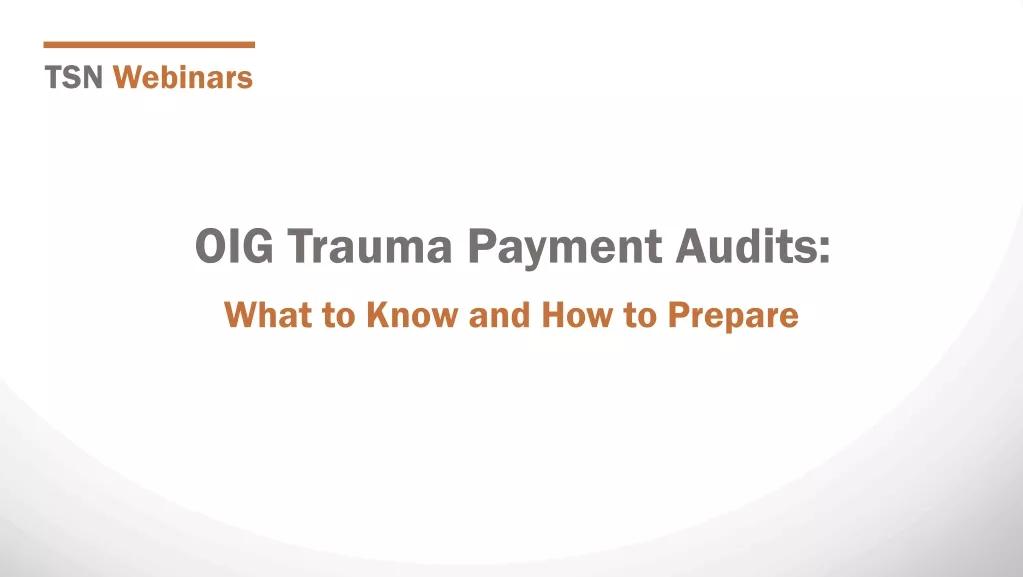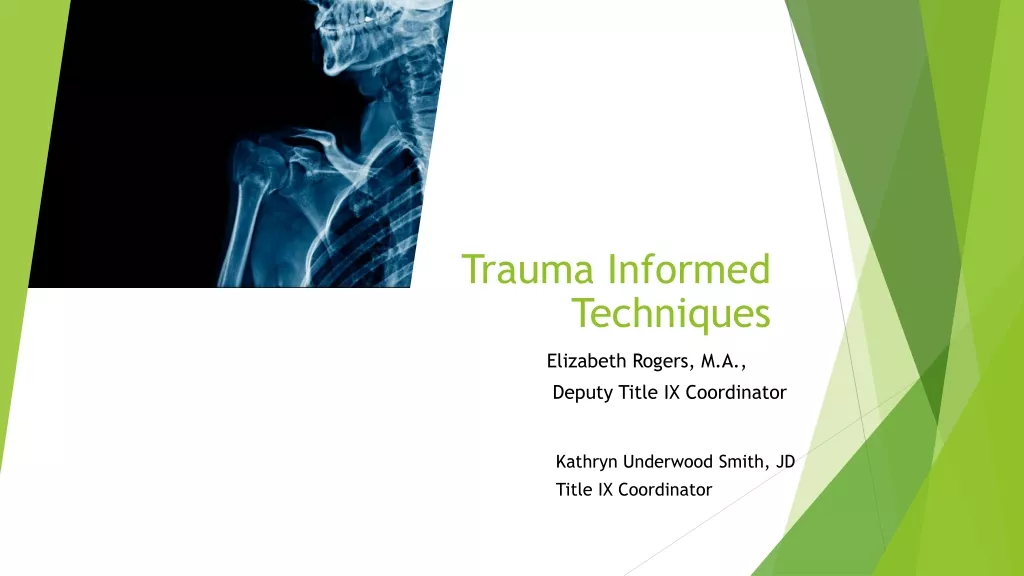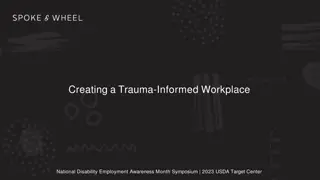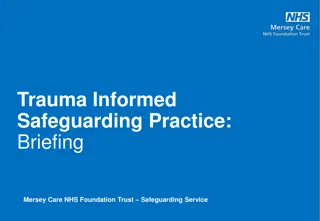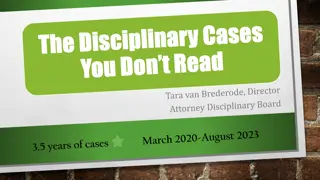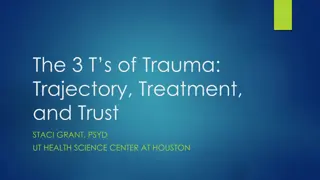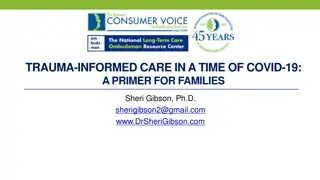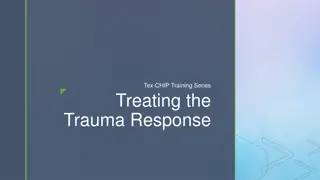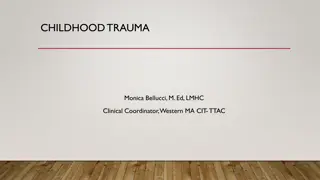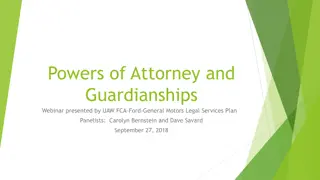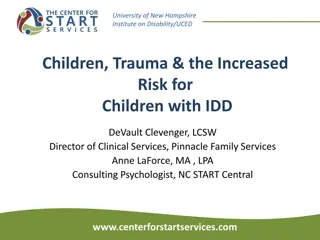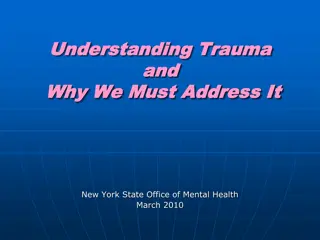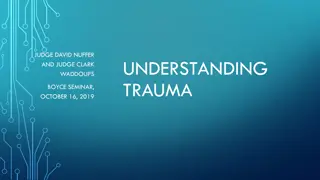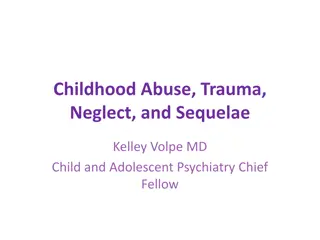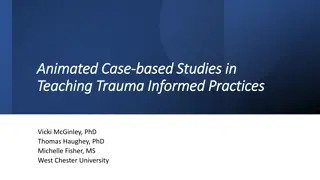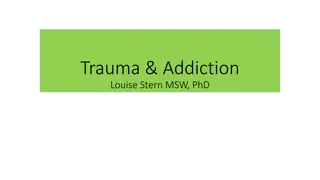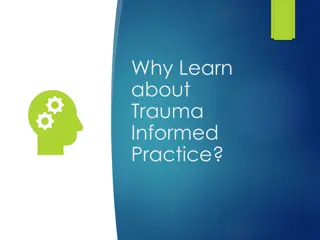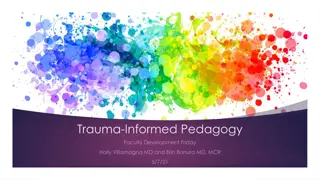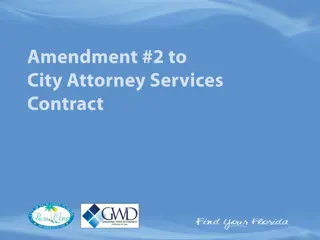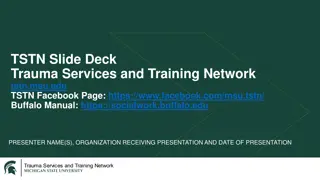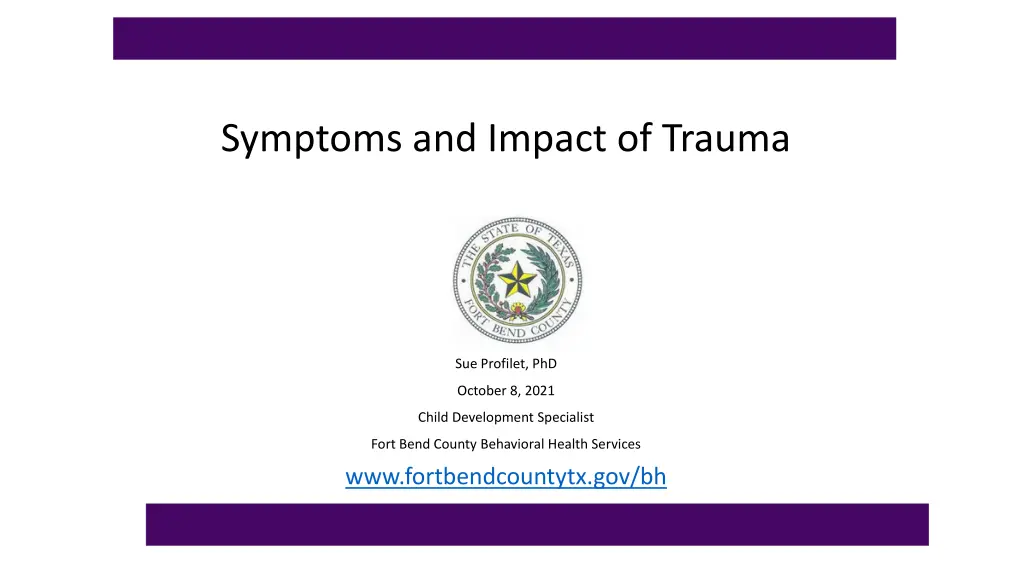
Understanding Trauma: Symptoms, Impact, and Complexities
Explore the symptoms and impact of trauma on children's development, emotional well-being, memories, and decision-making. Learn from experts like Dr. Bruce Perry about the lifelong effects of prenatal and childhood trauma, traumatic events, and the concept of complex trauma. Understand the difference between 'what is wrong with you' vs. 'what happened to you' to provide trauma-informed care and support.
Download Presentation

Please find below an Image/Link to download the presentation.
The content on the website is provided AS IS for your information and personal use only. It may not be sold, licensed, or shared on other websites without obtaining consent from the author. If you encounter any issues during the download, it is possible that the publisher has removed the file from their server.
You are allowed to download the files provided on this website for personal or commercial use, subject to the condition that they are used lawfully. All files are the property of their respective owners.
The content on the website is provided AS IS for your information and personal use only. It may not be sold, licensed, or shared on other websites without obtaining consent from the author.
E N D
Presentation Transcript
Symptoms and Impact of Trauma Sue Profilet, PhD October 8, 2021 Child Development Specialist Fort Bend County Behavioral Health Services www.fortbendcountytx.gov/bh
Overview Trauma-Informed Care: What is wrong with you vs. what happened to you? What is a traumatic event? Complex trauma? Symptoms of trauma Impact of trauma Developmental Emotional Memories Behavioral Decision making
What Happened to You? Prenatal and childhood trauma can have a lifelong effect Trauma affects how a child s brain develops Children are likely to display emotional and behavioral issues following traumatic experiences Dr. Bruce Perry and Oprah Winfrey new book - what happens to us in early childhood both good and bad influences the people we will become
Dr. Bruce Perry Senior Fellow ofThe Child Trauma Academy,in Houston, and Professor in the Departments of Psychiatry and Behavioral Sciences at Northwestern University Author ofThe Boy Who Was Raised as a Dog, based on his work with maltreated children https://www.youtube.com/watch?v=Q_3HjXNjgbQ&t=171s
What is a Traumatic Event? National Child Traumatic Stress Network (nctsn.org): A frightening, dangerous, or violent event that poses a threat to a child s life or bodily integrity Witnessing a traumatic event that threatens life or physical security of a loved one
What are Some Traumatic Experiences? Physical, sexual, or psychological abuse and neglect Natural disasters or terrorism Family or community violence Sudden or violent loss of a loved one Refugee and war experiences Serious accidents or life-threatening illness Military family-related stressors (deployment, parental loss or injury)
What is Complex Trauma? Both children s exposure to multiple traumatic events often of an invasive, interpersonal nature and the wide- ranging, long-term effects of this exposure Events that are severe and pervasive, such as abuse or neglect Occur early in life and can disrupt many aspects of the child s development and formation of a sense of self
Complex Childhood Trauma Affects the Brain It changes the neural system to appear like one that is always anticipating or responding to trauma Hyperarousal when one s body kicks into high alert as a result of thinking about their trauma
Symptoms of Childhood Trauma Increase in health-risk behaviors Likely to have long-term health problems or die at an earlier age Increased use of health/mental health services and increased involvement with child welfare and juvenile justice systems Adult survivors may have difficulty in establishing relationships and maintaining employment
Impact of Trauma on Child Development Emotions Memories Behavior Decision Making
Child Development Age, maturity, and experience influence how we react to stress after traumatic experience Children under age 5 are NOT too young to know what happened during traumatic event and the impression that was left is not forgotten Traumatic experiences affect brains and behavior of even very young children, with similar reactions to those seen in older children and adults
Emotions Difficulty with self-regulation: expressing and managing emotions Emotional regulation: control over How and when how often Intensity react powerfully Positive/negative May be difficult to calm down
Emotion Continued Child may react to a reminder of traumatic event/threat with: trembling, anger, sadness, or avoidance Being vigilant and guarded in their interactions with others Tuning out (emotional numbing) Being overwhelmed, fearful, or depressed
Memories Early childhood trauma - associated with reduced size of the brain cortex This area is responsible for many complex functions including memory, attention, perceptual awareness, thinking, language, and consciousness These changes may affect ability to regulate emotions
Memories School Age and Adolescents Have wide range of intrusive images and thoughts Think about frightening moments that happened during their traumatic experiences Go over what could have stopped the trauma from happening and what could have made it turn out differently Respond to reminders about the trauma
Behavior Child may: be easily triggered or set off react very intensely react defensively and aggressively in response to perceived blame or attack behave in ways that appear unpredictable, oppositional, and extreme lack impulse control or the ability to think through consequences before acting
Behavior Continued - Child may: be overcontrolled, rigid, and unusually compliant seem spacey , detached, distant, or out of touch with reality engage in high-risk behavior engage in illegal activities
Decision Making Something about stress of early childhood is changing the brain systems that allows one to attend to information that might signal potential risk or loss Those who experienced childhood trauma tend to: 1. have lower brain activity during decision making and higher activity afterward - often making the choice that they were warned against
Decision Making Continued - 2. become young adults unable to correctly consider risk and make healthy life decisions This can lead to substance abuse, addictions, and other self- defeating coping mechanisms, common to untreated trauma

